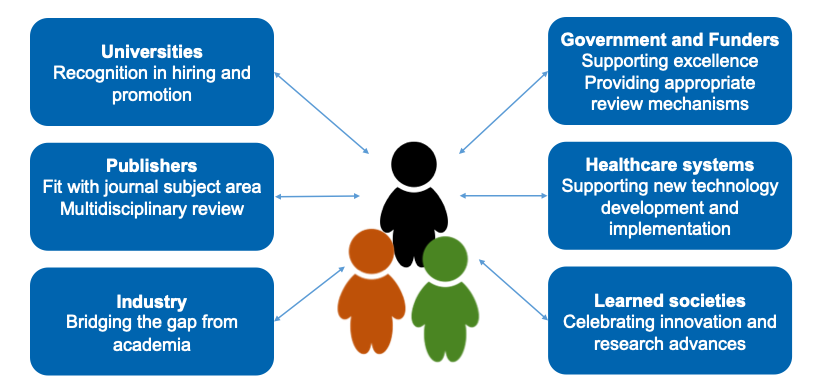Policy
Policy
The practice of convergence science offers “a means of solving complex problems focusing on societal needs. It entails integrating knowledge, methods, and expertise from different disciplines and forming novel frameworks to catalyse scientific discovery and innovation”. By building convergence approaches, a new generation of researchers will be trained to confidently straddle disciplinary boundaries. However, it is critical that academic bodies, research institutions, funders, publishers, policy makers and learned societies are able to recognise the new skills that scientists can gain from convergence research and foster them appropriately. The alignment of the entire research ecosystem to support convergent scientists’ career and development is critical.
To do so, we need to understand the current international landscape for convergence science and offer solutions for its uptake. This includes consultations with funders, universities, institutes in the UK and abroad, learned societies, policy makers, as well as journal editors and publishers.

To develop recommendations, we are consulting with the UK research community to understand the value of cross-disciplinary research and their perceptions about whether this is supported by the research ecosystem. This takes the form of two approaches – the first is a survey to understand the range of opinions of convergence science across the research community.
The second is to interview a cross-section of researchers to offer a more comprehensive analysis of both positive and negative perceptions of cross-disciplinary research and how well it is supported. This will be used to bring more depth to our survey results and build case studies of successful cross-disciplinary research. In particular, it will highlight how cross-disciplinary research has impacted researchers’ careers and how research findings have been disseminated positively.
We are also consulting with research institutions in the UK and internationally to understand different models for supporting cross-disciplinary research. This focuses on understanding the motivations behind needing a cross-disciplinary research approach and how they have identified and addressed barriers to convergence science to support career development – in particular through hiring and promotion.
Funders play a significant role in facilitating cross-disciplinary research, providing financial support for research scientists, consumables and equipment. Through this consultation we are exploring the motivations of funders to:
While the survey results highlight the experiences of the research community in undertaking cross-disciplinary research, it is also important to understand how journals approach publication of such studies. We are consulting with journal editors to understand:
The UK has a number of domain-specific learned societies, and the purpose of the consultation is to understand whether they have mechanisms in place to support researchers who span disciplines and to recognise their achievements. We aim to understand whether the societies have:
The results of our work will be used to qualitatively understand the barriers that limit the progress of convergence science. It will also identify the enablers and achievable solutions that could open new research fields and accelerate new and high quality health and social care interventions.
Once collected, this information will catalyse conversations within a steering committee, which will represent the different key players of the research ecosystem. Their role will be to interpret the consultation findings to reach an agreement on the recommendations that will be put forward to the convergent science community, policy makers, funders and universities in the form of a policy report.
The output will include:
If you have any feedback on our work, or would like to be involved in the consultation, please contact Arnaud Legrand (arnaud.legrand@icr.ac.uk).